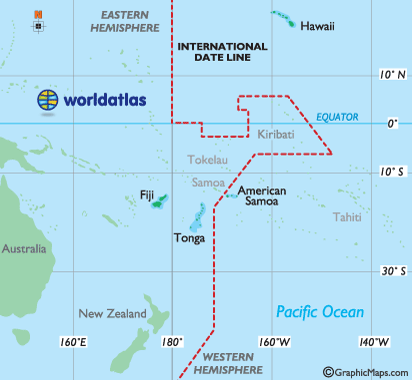Through the Pacific Ocean, there runs an internationally recognized line, separating one day from the next. Each new day, say this coming May 21, 2011, will "emerge" in the Pacific Ocean, with Tonga one of the first to experience the sunrise of the newest day, followed by Fiji, New Zealand, Australia, and Japan.
Samoa, Tahiti, and Hawaii are three of the better known Pacific Island groups to end a given day. But Samoa now wants to change the situation. Though Samoa is just three time zones difference from Sydney Australia, yet the island is 21 hours behind. Samoan Prime Minister Tuilaepa Sailele Malielegaoi explains: "While it's Friday here, it's Saturday in New Zealand and when we're at church Sunday, they're already conducting business on [Monday] in Sydney and Brisbane. ... In doing business with New Zealand and Australia, we're losing out on two working days a week."
The end of 2011, Samoa will move the international date line to its east, allowing it to be counted as on the same day as its neighbors to the west.
Samoa's change comes 119 years after the country first moved in the opposite direction. Then, it transferred to the east side of the international date line in an effort to aid trade with the US and Europe.
However, Australia and New Zealand have increasingly become Samoa's biggest trading partners, thus the end of this year (from 29 December 2011) it will be three hours ahead ... on the same day.
Samoa is not to be confused with American Samoa, a smaller grouping of islands to the east of Samoa's two major islands.
Samoa has a population of 180,000 people. The BBC country profile offers the following: Known as Western Samoa until 1997, the nation is made up of nine volcanic islands, two of which - Savai'i and Upolu - make up more than 99% of the land. It was governed by New Zealand until its people voted for independence in 1961.
Samoa has the world's second-largest Polynesian group, after the Maori. Its deeply conservative and devoutly Christian society centers around the extended family, which is headed by an elected chief who directs the family's social, economic and political affairs, and the church, which is a focus of recreational and social life. Many Samoan villages hold up to 20 minutes of prayer curfews in the evenings.
The economy revolves around fishing and agriculture, which is vulnerable to cyclones and disease. Attempts at diversification have met with success. Tourism is growing spectacularly, though it suffered a great setback from a major tsunami in 2009. (The devastating tsunami which struck Samoa in September 2009 killed 143 people and wiped out large stretches of the south and south-east coasts of the main island of Upolu. The tsunami damaged or destroyed around 25% of Samoa’s tourist accommodation stock, including several high-end resorts, in one of the most picturesque parts of the country.)
Offshore banking spearheads an expanding services sector. Light manufacturing is expanding and has attracted foreign investment. Its main exports are coconut oil and cream, copra, fish, and beer. (Vailima - meaning "water in the hand" is a Germany style lager started in cooperation with a German company - Hasse Braurei. The beer, which uses hops from Hallertau, Germany, is light with a refreshing taste - so says the website at any rate.)
Apia is Samoa's capital, and largest town of 36,000
Samoa has spectacular beaches and mountains as other Pacific Islands, and has a fast expanding tourism industry though mainly from New Zealanders and Australians - not the international population that its neighbor Tahiti to the east receives.
Samoa switched to driving on the left in 2009, in another move towards unifying its practices with its South Pacific neighbors. A two-day holiday was declared to ease traffic as people got used to the new rules. A three-day ban on alcohol sales was also introduced to deter accidents.
The nation has a modest $5,200 per capita income so it experiences all the issues of a developing nation. Its educational system however has been particularly effective - with a literacy rate of over 97%.
Samoan students with national flag
Food in Samoa derives mainly from tropical crops, root vegetables, coconut products, fresh fruit, pork, chicken and, of course, seafood. The traditional Polynesian feast is cooked in an umu, an above-the-ground oven. The traditional Sunday meal is nearly always cooked in the umu.
Seafood abounds
One's average Samoan family
This is a big world, we happen to have been born into a dominant country, itself part of a prosperous and powerful Western civilization. We're "oversupplied" with news though it may not inform us well. "Six stories from seven continents" is a modest effort to remind ourselves there are snippets, events, and stories from all around the world to hear and learn from... that our awareness is incomplete, and life is breathtakingly more complex and wonderful than we usually imagine.
North Korea

The always bombastic and unpredictable North Koreans go hysterical again. This time the country is prepared to "go to war" with South Korea because that country is playing loudspeakers directed at North Korean territory. A headline from a UK paper reads, "More than 50 North Korea submarines 'leave their bases' as war talks with South continue "


No comments:
Post a Comment